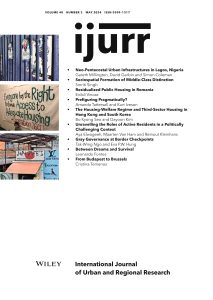Shadow trading is a common activity along state borders. Its omnipresence is puzzling because border checkpoints are highly regulated spaces that are heavily gated and securitized. Most studies attribute such a paradox to ineffective border control and corruption. However, this line of argument overlooks the peculiar nature of border and checkpoint governance. We explore this phenomenon with a case study of the Sino-Kazakh border where shadow traders negotiate their passage every day. We find that border crossing is a highly organized activity dictated by informal yet specific and meticulous rules that are enforced by various state and non-state actors. Together, they constitute a kind of gray governance that is thoroughly entwined with the formal regime. It is a kind of technology of rule that enables the state to selectively enforce formal and informal rules so as to accommodate the conflicting goals of border control.
The IJURR Editorial Board have voted this as the Best Article Prizewinner of 2024.
This article analyzes shadow trade in the Sino-Kazakhborder, exploring the informal traders’ daily crossings of the border. Beyond ineffective border control and corruption, the case shows the mobilization of grey governance practices of various state and non-state actors within negotiations in highly organized informal structures superposed and entangled with specific rules of the formal regime. This article is free to access for three months.

